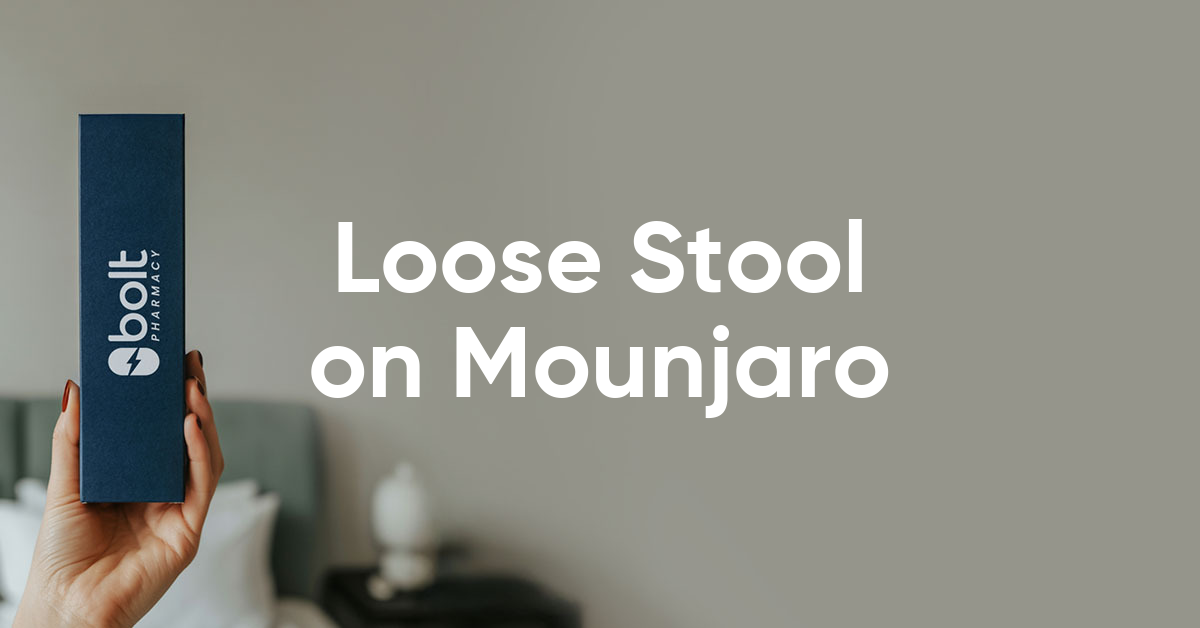Loose stools on Mounjaro (tirzepatide) are a very common side effect, affecting up to 20% of patients treated for type 2 diabetes. This gastrointestinal disturbance typically occurs during initial treatment or following dose increases, reflecting the medication's action on gut motility and gastric emptying. Whilst often mild and transient, understanding why these symptoms occur and how to manage them effectively is essential for maintaining treatment adherence. Most patients experience improvement as their body adapts to therapy, though certain presentations require medical assessment to exclude complications or alternative diagnoses.
Summary: Loose stools on Mounjaro occur in up to 20% of patients due to the medication's effects on gastric emptying and intestinal motility, typically improving with continued treatment.
- Mounjaro (tirzepatide) is a dual GIP and GLP-1 receptor agonist licensed in the UK for type 2 diabetes mellitus treatment
- Gastrointestinal symptoms result from slowed gastric emptying and altered gut motility caused by GLP-1 receptor activation
- Symptoms are dose-dependent and most commonly occur during initial weeks or following dose escalation
- Management includes dietary modifications (increased soluble fibre, smaller meals), adequate hydration, and avoiding trigger foods
- Seek medical advice for persistent diarrhoea beyond 7 days, dehydration signs, blood in stools, or severe abdominal pain
- Most patients experience symptom improvement over time as physiological adaptation occurs with continued treatment
Table of Contents
Understanding Loose Stools as a Side Effect of Mounjaro
Mounjaro (tirzepatide) is a glucose-dependent insulinotropic polypeptide (GIP) and glucagon-like peptide-1 (GLP-1) receptor agonist licensed in the UK for the treatment of type 2 diabetes mellitus. Whilst the medication demonstrates significant efficacy in glycaemic control, gastrointestinal side effects are amongst the most commonly reported adverse reactions during treatment.
Loose stools and diarrhoea represent frequent gastrointestinal disturbances experienced by patients initiating or escalating doses of Mounjaro. According to the UK Summary of Product Characteristics (SmPC), diarrhoea is very common, occurring in up to 20% of patients, with the incidence varying according to dose strength. These symptoms typically manifest during the initial weeks of therapy or following dose titration, though individual experiences vary considerably.
It is important to distinguish between loose stools—characterised by increased stool frequency and decreased consistency (types 5-7 on the Bristol Stool Chart)—and more severe diarrhoea requiring medical intervention. Most patients experience mild to moderate symptoms that improve with time as the body adapts to the medication. The gastrointestinal effects are considered a class effect of GLP-1 receptor agonists.
Patients should be counselled about the likelihood of bowel changes before commencing treatment, as this foreknowledge can reduce anxiety and improve treatment adherence. Understanding that these symptoms are common, generally transient, and manageable helps patients maintain realistic expectations whilst benefiting from Mounjaro's therapeutic effects on glucose control.

Why Mounjaro Causes Gastrointestinal Symptoms
The mechanism underlying loose stools during Mounjaro treatment relates directly to the drug's pharmacological action on the gastrointestinal tract. As a dual GIP and GLP-1 receptor agonist, tirzepatide influences physiological processes that affect bowel function and digestive motility.
GLP-1 receptors are expressed throughout the gastrointestinal system. When activated by Mounjaro, these receptors slow gastric emptying—the rate at which food moves from the stomach into the small intestine. This delayed transit can alter the normal digestive process, affecting fluid absorption and bowel consistency. Additionally, GLP-1 receptor activation influences intestinal motility patterns, which may contribute to looser stools.
The medication also affects the enteric nervous system, which governs digestive function. Changes in neural signalling within the gut can alter peristaltic movements, leading to variations in stool frequency and consistency.
Dose-dependent effects are particularly relevant—higher doses of Mounjaro generally correlate with increased gastrointestinal symptoms, as noted in the UK SmPC. This relationship explains why symptoms often emerge or intensify following dose escalation. The gradual dose titration schedule as per the UK SmPC (starting at 2.5 mg weekly and increasing incrementally) aims to minimise these effects by allowing physiological adaptation.
It's important to note that sustained diarrhoea can lead to dehydration and potentially acute kidney injury, particularly in patients with existing renal impairment or those taking medications such as diuretics or SGLT2 inhibitors. Individual susceptibility varies based on baseline gut sensitivity, dietary habits, concurrent medications, and underlying gastrointestinal conditions.
Managing Loose Stools While Taking Mounjaro
Effective management of loose stools during Mounjaro treatment involves a combination of dietary modifications, lifestyle adjustments, and symptomatic relief measures . Most patients can successfully control mild to moderate symptoms without discontinuing therapy.
Dietary strategies form the cornerstone of symptom management:
-
Increase soluble fibre intake through foods such as oats, bananas, apples, and root vegetables, which help bulk stools and improve consistency
-
Avoid trigger foods including high-fat meals, spicy dishes, caffeine, alcohol, and artificial sweeteners, which may exacerbate symptoms
-
Eat smaller, more frequent meals rather than large portions, reducing the burden on the digestive system
-
Stay well-hydrated with water and, if needed, oral rehydration solutions (avoid fruit juices and fizzy drinks as these can worsen diarrhoea)
-
Consider temporary dietary adjustments if symptoms are particularly troublesome, though this should be undertaken with healthcare professional guidance
Practical lifestyle measures include maintaining regular meal times to establish predictable bowel patterns and avoiding eating close to bedtime. Patients should also be mindful of medication timing—administering Mounjaro on the same day each week, preferably when dietary routine is most stable.
Over-the-counter remedies such as loperamide may provide short-term relief for occasional loose stools, though should not be used if you have blood in your stool, high fever, or suspected colitis. Regular use should be discussed with a healthcare professional. Probiotic supplements have limited evidence specifically for GLP-1-related symptoms.
Patients experiencing persistent symptoms should consult their prescriber about temporarily pausing dose escalation or maintaining a lower dose until gastrointestinal tolerance improves. Patients taking insulin or sulfonylureas should monitor blood glucose levels more frequently when experiencing gastrointestinal symptoms, as reduced food intake may increase hypoglycaemia risk.
When to Seek Medical Advice About Bowel Changes
Whilst loose stools are commonly experienced during Mounjaro treatment, certain presentations warrant prompt medical assessment to exclude complications or alternative diagnoses. Patients should be educated about red flag symptoms that require urgent evaluation.
Contact your GP, prescribing clinician or NHS 111 if you experience:
-
Diarrhoea that persists for more than 7 days
-
Signs of dehydration including excessive thirst, dark urine, dizziness, very little or no urination, confusion, or inability to keep fluids down
-
Blood in stools or black, tarry stools suggesting gastrointestinal bleeding
-
Severe abdominal pain, particularly if constant, worsening, or accompanied by fever
-
Unintentional weight loss beyond expected therapeutic effects
-
Symptoms of pancreatitis such as persistent severe upper abdominal pain radiating to the back, nausea, and vomiting—this requires urgent medical assessment
Patients with pre-existing gastrointestinal conditions including inflammatory bowel disease, irritable bowel syndrome, or previous bowel surgery should maintain closer monitoring, as Mounjaro may exacerbate underlying conditions. Similarly, those taking concurrent medications affecting bowel function should discuss potential interactions with their healthcare provider.
Electrolyte disturbances secondary to prolonged diarrhoea can precipitate serious complications, particularly in vulnerable populations including older adults, those with renal impairment, or patients taking diuretics or other medications affecting fluid balance. Healthcare professionals may recommend blood tests to assess electrolyte levels and renal function if symptoms are protracted.
It is essential to differentiate between expected medication side effects and infectious gastroenteritis or other acute gastrointestinal pathology. If symptoms develop suddenly with fever, vomiting, or known exposure to infectious agents, alternative causes should be investigated. Never assume all bowel changes are medication-related without appropriate clinical assessment, particularly if the symptom pattern differs from previous experiences with dose adjustments.
Long-Term Outlook and Adaptation to Treatment
The natural history of gastrointestinal side effects during Mounjaro treatment is generally favourable, with most patients experiencing improvement over time. Understanding this trajectory helps maintain treatment adherence during the initial adjustment period.
Clinical experience suggests that gastrointestinal symptoms, including loose stools, often improve as physiological adaptation occurs. Many patients report substantial resolution of bowel symptoms with continued treatment, even whilst maintaining therapeutic doses. This adaptation reflects the body's adjustment to altered gastric emptying and gut motility patterns.
Long-term tolerability is generally good, with discontinuation rates due to gastrointestinal adverse effects remaining relatively low according to the UK SmPC. Patients who persist through the initial symptomatic period typically achieve stable bowel patterns compatible with normal daily activities. The metabolic benefits of Mounjaro—including improved glycaemic control, weight reduction, and improvements in cardiovascular risk factors—often justify temporary tolerance of mild gastrointestinal symptoms for most patients.
For the minority experiencing persistent symptoms beyond three months, reassessment of the treatment plan is appropriate. Options include maintaining a lower maintenance dose, switching to alternative GLP-1 receptor agonists with potentially different tolerability profiles, or considering non-GLP-1-based therapies. NICE guidance emphasises individualised treatment decisions balancing efficacy, tolerability, and patient preference.
Patient education and expectation management significantly influence treatment satisfaction and adherence. Clinicians should provide realistic timelines for symptom resolution, reinforce management strategies, and schedule appropriate follow-up to monitor both therapeutic response and adverse effects.
If you suspect you're experiencing side effects from Mounjaro, you can report these through the MHRA Yellow Card scheme (yellowcard.mhra.gov.uk). With proper support and management, the majority of patients successfully navigate the initial adjustment period and achieve sustained benefit from Mounjaro therapy whilst maintaining acceptable gastrointestinal function and quality of life.
Frequently Asked Questions
How long do loose stools last when taking Mounjaro?
Loose stools typically occur during the initial weeks of Mounjaro treatment or following dose increases, with most patients experiencing improvement as their body adapts to the medication. Symptoms often resolve substantially within the first few months of continued treatment.
Can I take loperamide for diarrhoea whilst on Mounjaro?
Loperamide may provide short-term relief for occasional loose stools on Mounjaro, but should not be used if you have blood in your stool, high fever, or suspected colitis. Regular use should be discussed with your healthcare professional.
When should I contact my doctor about bowel changes on Mounjaro?
Contact your GP or NHS 111 if diarrhoea persists beyond 7 days, you develop signs of dehydration, notice blood in stools, experience severe abdominal pain, or develop symptoms of pancreatitis such as persistent upper abdominal pain radiating to the back.
The health-related content published on this site is based on credible scientific sources and is periodically reviewed to ensure accuracy and relevance. Although we aim to reflect the most current medical knowledge, the material is meant for general education and awareness only.
The information on this site is not a substitute for professional medical advice. For any health concerns, please speak with a qualified medical professional. By using this information, you acknowledge responsibility for any decisions made and understand we are not liable for any consequences that may result.
Heading 1
Heading 2
Heading 3
Heading 4
Heading 5
Heading 6
Lorem ipsum dolor sit amet, consectetur adipiscing elit, sed do eiusmod tempor incididunt ut labore et dolore magna aliqua. Ut enim ad minim veniam, quis nostrud exercitation ullamco laboris nisi ut aliquip ex ea commodo consequat. Duis aute irure dolor in reprehenderit in voluptate velit esse cillum dolore eu fugiat nulla pariatur.
Block quote
Ordered list
- Item 1
- Item 2
- Item 3
Unordered list
- Item A
- Item B
- Item C
Bold text
Emphasis
Superscript
Subscript










